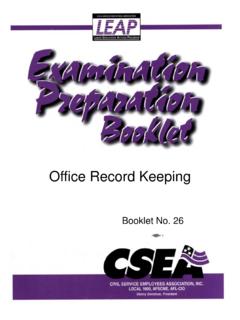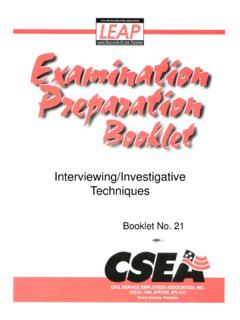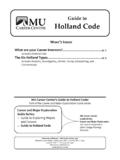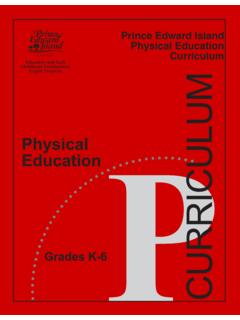Transcription of Improving Your Test-Taking Skills
1 CIVIL SERVICE EMPLOYEES ASSOCIATION, 1000, AFSCME, AFL-CIOD anny Donohue, PresidentCIVIL SERVICE EMPLOYEES ASSOCIATIONI mproving YourTest- taking SkillsBooklet ITTSLABOR EDUCATION ACTION PROGRAMB ooklet ITTSI mproving YourTest- taking SkillsThe CSEA Examination Preparation Booklet Series is designed to help membersprepare for New York State and local government civil service examinations. Thisbooklet is designed for practice purposes only and its content may not conform tothat of any particular civil service , Reprinted March 1998 Not To Be Reproduced Without Permission1 Improving YourTest- taking SkillsThe information in this booklet is the result of ten years of studying the Civil Serviceexam system and teaching people how to improve their scores. Many people have foundthat this information has been extremely helpful to them, especially when they vecombined it with systematic practice with exam preparation questions. We have includedpractice questions and explanations in this booklet.
2 In addition, there are other test-takingbooklets available through CSEA which will provide you with more practice if you feelyou need it. Many of these other booklets were prepared for state promotional exams, butthe categories they cover are the same or very similar to those found on county is a list of available booklets in the booklet is divided into two sections: Test-Taking tips and sample readingcomprehension questions. The Test-Taking tips section includes an outline of general Test-Taking tips, a more detailed version of the general Test-Taking tips, and a few tips foranswering reading comprehension questions correctly. The sample questions sectionincludes the reading comprehension questions themselves, an answer key, and fullexplanations. As we mentioned above, there is also an appendix in the back of thebooklet which gives a listing of the booklets available from CSEA, as well as theDiagnostic Worksheet. We will explain the use of the worksheet Test-Taking TipsFirst, a quick , practice, patient and where you re going and get there t be thrown by initial deep breaths and short rest very the best possible the reasonableness of your t overanalyze and don t jump to , NEVER leave an answer your scrap paper with respect31)PRACTICEPRACTICE, PRACTICE, PRACTICE.
3 Practice is crucial. We have been toldcountless times by people that practicing with sample questions has significantlyraised their scores, sometimes by more than thirty points. Keep practicing, even ifyou have doubts about your ability to do any better. If you take the time to practice,you will improve. As you practice, you develop an understanding of how to do wellon these exams. It s as if you are adding a new compartment in the brain, a multiple-choice mind, that you can trot out for the exams and keep in mothballsthe rest of the time if you have included a number of sample questions and complete explanations for themin this booklet. If you make a separate answer sheet for yourself rather than markingyour answers in the booklet, you ll be able to work with the questions more thanonce. It s best to do a few questions and then check your answers rather than doingall of the questions at once. In this way, you can see whether or not you re on theright track.
4 Even if you've answered a question correctly, read the explanation onceto make sure your answer is right for the right reasons. If you have time, go backover the questions the week before the exam. You should be able to see animprovement in your scores, and this should increase your self-confidence. Doingthe same questions over a period of time will also help you to be more aware of thetendencies and habits you have that do you in. In order to further help you assessyour Test-Taking habits, we ve included a diagnostic worksheet in the Appendix. Itcontains a listing of some common problems people have and has proven to be avaluable self-assessment is also important because the exam can be a test of your endurance asmuch as a test of your reasoning ability. Most of us are not used to sitting for hoursreading something that we aren t particularly interested in, and trying to figure outquestions that we could care less about. Since practicing with exam preparationquestions at home does not require the same amount of endurance as taking theactual exam, we ve tipped the scales a bit by making the reading passages in thisbooklet longer than the ones you would most likely find on an you d like more questions to practice with, you can match up many of the subjectslisted on your exam announcement with the other test preparation booklets that areavailable through CSEA, and order those you feel might be helpful to you.
5 No matterhow many questions you choose to work with, try to spread your studying out over aperiod of time. It isn t wise to pack all of your studying into the week or night beforethe exam. Some people are successful at cramming, but, for most of us, crammingresults in lost sleep and not being able to think clearly during the exam. It s fine todo something fun the night before the exam if you can, but not too much fun or elseyou ll be tired and unable to think. Of course, if you would rather spend the evening4before the exam reviewing some Test-Taking material, then you should do so. Ineither case, whether you decide to work or play, moderation is to reward yourself after you finish the exam. Getting ready for and taking anexam can make people feel deprived; having something to look forward to can do alot to foster perseverance. It doesn t have to cost money. It might be something you'dfeel guilty about otherwise taking the rest of the day to do something just foryourself perhaps.
6 It doesn t matter what it is as long as it makes you feel )BE POSITIVEIt helps so much to look at this as a positive experience rather than as a dreadedactivity that s being forced upon you. You may hate the idea, the very thought maysend you into a spasm of negativity, but please try to figure out some way that takingthis exam is benefiting you. (At the very least, it s good practice for the next one.)Whenever you start to feel anxious, put upon, resentful, or whatever, remind yourselfof the course, we aren t saying that positive thoughts are all that are necessary. In mostcases, practicing with the Test-Taking booklets is more valuable. But what we tellourselves has a great effect on how we view what s happening to us, and this canaffect what will happen to us. Many studies have shown that people who consciouslytry to think positively can improve their performance significantly. This is true evenin such areas as job interviews where it would seem that our own thoughts wouldn tcarry as much weight as those of the do you tell yourself about the exams and your prospects?
7 If your internalcommunication runs something like: I M NOT A TEST-TAKER, I NEVER DOWELL ON TIIESE EXAMS, AND I M TERRIBLE AT MATH, it s probablypreventing you from doing as well as you otherwise might. If we already feeldoomed to failure, how can we put much energy into learning how to do well? Themore we repeat negative phrases, the more we reinforce them and the more difficultit is to overcome them. If we worry and obsess about the exam before, during and/oreven after it s over, we re also wasting a lot of energy. Thinking takes energy, andnegative thinking takes even more energy. Fear, anxiety, or any other type ofnegative thinking is often very draining. That s why we feel exhausted when we reextremely worried about something or when we re under a lot of emotional s very important to take the time to listen to your thinking so you can discoverwhat really goes on in your mind. Once you have become better acquainted withyour thought processes and have observed patterns of negative communications, you5can change these habits by saying things that are the opposite of your fears orexpectations.
8 If math is your demon, then keep telling yourself, I do well in math. If you get anxious when taking tests , and the page starts swimming before your eyes,tell yourself, I think clearly under pressure. Create sentences that are positive andin the present. It s better to say, I am perfectly calm whenever I take an exam thanto say, I will not be nervous during the exam. The latter phrase introduces anelement of doubt, and there are generally enough doubts in our minds some people, their negative self-talk involves putting themselves down, perhapsbecause they don t feel they do well on tests . If this is true for you, try to rememberthat being able to answer test questions correctly does not reflect upon yourintelligence, your worth, or how well you actually do your job. It just reflects uponyour ability to answer test questions. That s all. If you doubt this, think about peopleyou know who are good at taking tests , but lacking in other areas like jobcompetence or personality or basic human decency.
9 Then think of those who aregreat people, highly intelligent, or incredibly effective in their jobs, but who doterribly on the )BE PATIENT AND PERSISTENTHave patience with yourself, with the exam preparation questions we ve provided,and with the exam itself. When you practice, don t get depressed or upset if you dopoorly at first or if you have done poorly in the past. You will favorite trick of the impatient mind is to think that there must be a typo in theexam booklet or to be overly enamored with choice d: none of the above. Typosdo occur, but not that frequently, and none of the above is rarely the correctanswer. In fact, it s not even given as a choice for most are good test-takers and there are bad test-takers. Good test-takers haveconfidence; they believe that the problem can be solved and that they can solve they believe they can do it, they have the persistence to be good problemsolvers. They stick with a problem until they get an answer. They analyze problemsstep by step, breaking them down into parts, and solving them piece by piece.
10 Andfinally, they are active thinkers. They do anything to make the problem manageableand concrete: translate it into real life examples, draw diagrams, write things downin simple terms, or reorganize the )KNOW WHERE YOU RE GOING AND GET THERE EARLYMake sure you know where you re going, how to get there, and if parking will be aproblem. Try to leave the house a little bit early. Of course, you can still take theexam even if you re late, but why do that to yourself?5)BE PREPAREDBe prepared provision your admittance card, and some form of in case you need a calculator if math or tables are included on the exam. In the past, peopleweren t allowed to use calculators in the exams, but people have been able to usethem in recent years. So bring one just in a watch to reassure yourself that you have enough time, or to time is generally enough time to answer the questions, but timing yourself willkeep you from using up too much time and energy on one a few #2 )BEING PREPARED INCLUDES BRINGING FOODWe made this a separate category because it is so Service tells people to bring food for the longer exams, but very few people doso.









